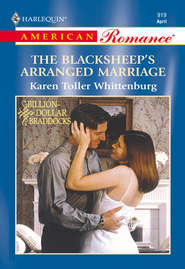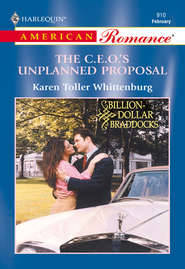По всем вопросам обращайтесь на: info@litportal.ru
(©) 2003-2024.
✖
The Matchmaker's Plan
Автор
Год написания книги
2018
Настройки чтения
Размер шрифта
Высота строк
Поля
“Oh, maybe the fact that our every conversation seems to turn into an argument.” Which wasn’t true, although it wasn’t entirely a lie, either. “Or maybe because she’s been avoiding me as much as possible for the past two months.” Which was true. He’d been avoiding her, too, but that was irrelevant. “Or maybe it’s because I’m on to this little matchmaking plan of yours and, for the record, I’m not interested. Never have been.” Which was a lie. “And never will be.” Again. Which was the truth.
The sparkle in Baby’s eyes merely brightened. “Wow, you’ve obviously given that a lot of thought.” Her gaze went to Miranda and some glimmer of understanding passed between the two women again. “Guess we won’t invite Peyton to lunch today.”
“Guess not,” Miranda said. “Guess we’ll just have to keep him all to ourselves.”
“Guess so.” Ainsley gave his arm a squeeze. “But, don’t worry, we’ll share you when the right woman comes along.”
“I’m not worried,” he replied. “Because the right woman isn’t going to come along for a very, very, very long time. If ever.”
Ainsley’s laugh conveyed more clearly than words just how much confidence she’d gained as a matchmaker during the past year. The smile she exchanged with Miranda told him she clearly had her romantic wand aimed at him. And clearly, Miranda also thought that he was a prime candidate for a makeover.
Protest was futile. But forewarned is forearmed, and he happened to know a few facts his sisters didn’t know. Weren’t ever going to know. So, let them plot to their hearts’ content. It would come to nothing, anyway. He and Peyton had agreed. And as far as he was concerned, that was the end of it.
PEYTON PUSHED her plate away, hoping no one would notice that she’d managed to massacre the cheeseburger, mangle and scatter the fries without eating a single bite. But, of course, no one would notice. The waiter was just trying to survive the lunch crowd. He didn’t care what food she left on her plate as long as he received his tip. Her lunch companion was even less interested than the waiter. Scarlett, at fifteen, was consumed with her own orbit, and barely aware that anyone else had a life apart from how it intersected with her own.
“You are not going to believe what she said after that.” Scarlett talked with a French fry, waving it like a baton before dipping it into first ketchup, then mayonnaise, then biting off the end. “‘It’s the silver Donna Karan or the blue Vera Wang, Scarlett.”’ She imitated their mother’s voice down to the imprecise slur of her Louisiana drawl. “‘You cannot have both. You do not need both. You may choose one, not both.”’ Scarlett double-dipped and bit again, chewing the fried potato as she pondered their mother’s complete ignorance. “I mean, puh-lease! As if I’d be caught dead in Karan or Wang! How can she think for one second I’d want to wear anything by a designer she likes?”
It was taken for granted, of course, that Peyton would agree. She was Scarlett’s main sounding board. At least when it came to discussing their mother. “How could Mother think you’d be interested in a dress by either of those very famous, very talented designers?” Peyton said. “Honestly, sometimes I think she does it just to torture you.”
Scarlett raised her perfect eyebrows and leveled a ketchup-smeared French fry for emphasis. “Don’t side with Mom, Peyton. Just because they couldn’t afford to buy you nice clothes when you were my age is no reason I should have to wear something I hate.” The ketchup end of the fry went into the lump of mayo and from there into Scarlett’s mouth. “Besides, this is a very special date for me. It’s important, and the dress has to be perfect.”
Here was the subject Peyton wanted to talk about and she chose her words carefully. “To impress Covington?”
“No, to impress Covington’s mother and father.” Her green eyes nailed Peyton’s best intentions. “I want Mr. and Mrs. Locke to see that even Louisiana swamp rats look pretty good in expensive clothes.” Scarlett was quick and had that uncanny teenagers’ knack of putting others on the defensive. “You have such a chip on your shoulder, Peyton. I don’t know why you bothered to move up here with us if all you’re going to do is find fault with every single boy I like just because he can trace his ancestry back to Plymouth Rock!”
“That’s not fair, Scarlett. I simply think Covington is too old for you.”
“He’s twenty. Five freaking years. Big deal.”
“At fifteen, five years is a big deal. He’s halfway through college. You’re still in high school. That difference in experience is a very big deal.”
“Mom doesn’t think so.” She played her ace casually, picked up another fry, changed the routine by skipping the ketchup, dipping only in the mayonnaise. “She likes Covington and thinks he’s perfect for me. She knows I’m very mature for my age.”
“So, as long as her opinions coincide with yours, then she really knows what she’s talking about.”
“If she thought Covington was too old for me, you’d be saying how smart she is. So why is it such a freaking sin that this time she happens to agree with me?”
Peyton had hoped to have a reasonable discussion. She’d thought she could say what neither of her parents would. She’d believed, foolishly it seemed, that Scarlett would listen to her. “Mother is easily…dazzled. She wants you to fit in so badly that she’s not giving you appropriate guidance. You’re fifteen. He’s twenty. Twenty, Scarlett. You should be dating boys your own age and, quite frankly, Covington should not be interested in dating someone so much younger than he is.”
Scarlett’s eyes flashed fury at the criticism. “That just shows how little you know, Peyton. For your information, Covington tells me I’m a lot more mature than the college girls he knows.”
“You’re underage, Scarlett, no matter how mature you may be. You have no business going to fraternity parties and he has no business inviting you. It’s not fair for him or anyone else to put you in situations you shouldn’t be in, situations that require choices you’re not ready to make.”
“How would you know? You never went to a fraternity party. You hardly ever even went out on a date. You went to class and came home. That’s it. You didn’t even live on campus.”
“I had to stay with you,” she retorted in self-defense. “Mom and Dad were working, and I didn’t live on campus so I could stay with you.”
“I never asked you to do that. I’ll bet Mom and Dad didn’t ask you to, either. You did it because you were too scared to go away to school. Or you did it because you liked feeling needed. I don’t know why you did it, and I don’t care.” She tossed the French fry onto her plate, wadded up her napkin, glared across the table. “I’m not going to make the mistakes you did, Peyton. By the time I’m twenty-seven, I’ll have had a million times more fun than you ever thought about having. And I’ll still turn out to be a whole heck of a lot smarter than you are now.”
That stung. Because it was true. Scarlett would have to be incredibly stupid, even at fifteen, to wind up in the situation Peyton now found herself in. Found herself. As if she hadn’t had a thing to do with getting there. As if she hadn’t, against every atom of good judgment, every molecule of good sense, willingly and willfully, made a really, really bad choice. And now she found herself without options.
Or at least without any options she wanted.
“Thanks for lunch.” The chair scraped across the floor as Scarlett pushed up from the table. “And thanks for caring, but the truth is I already have a mother. I don’t need another one.” She spun on her heel and flounced across the restaurant to the door, her slip of a purse bouncing against her slim little hip, her long dark hair swishing across her shoulders, her flippy strut and flippant attitude signaling her indignation.
And she was right.
Totally wrong in what she wanted, and was being allowed, to do. But absolutely right in thinking a sister had no authority to correct a parent’s mistake.
Peyton folded her own napkin, laid it beside her plate and waited for the bill to be delivered. She didn’t know why she’d ever thought talking to Scarlett about this was a good idea. She hadn’t been able to get her mother to see sense. Or her dad. So what had made her think she could persuade Scarlett? What had made her believe it was her duty to try?
She’d given up any claim to being a role model the night of Ainsley Danville’s wedding, the night she and Matt had gone looking for Scarlett.
They hadn’t found Scarlett or Covington, though it hadn’t been for lack of searching.
Oh, no, the lack had come later.
But she wasn’t going back over that night again. Not the worst of it. Not the best of it. If she could turn back the clock and change it all, from start to finish, she would. She’d stay at the party, stay out of Matt’s car, stay away from any possibility of finding herself in this…this untenable situation. But that door was closed. She had slammed it shut behind her, and now she had to follow the detour she had impetuously, and so unwisely, chosen.
The waiter brought the check; she gave him money and he returned with change, and she left it all on the table. She drank her ice water and let him refill the glass twice before, finally, pulling on her gloves, her coat, her scarf and heading out into the cold December air.
She hadn’t planned to see Matt Danville this afternoon, but the day was already ruined, her stomach already knotted with tension. And it wasn’t as if there would ever be a good time to face him and say the words that needed to be said. Nothing about this was going to be easy, no matter how much longer she put it off. So she might as well do it now, while the sky matched her mood and the air was cold enough to numb a heavy heart.
THE SNOWFLAKES of the morning had long since turned into a gray drizzle, but Matt swiveled his chair and stared out the rain-slicked window at the dreary afternoon. As if he had nothing to do. As if daydreaming was his main occupation. He had plenty of work awaiting him. Important work. Necessary work. Work that meant a world of difference to a child halfway around the world. A child he would never meet.
The wind chased a raindrop across the windowpane, leaving a wavy trail across the glass. A second drop splattered and raced to oblivion in three tiny rivulets. He wished that he could love this work, wished that it brought him the soul-deep satisfaction it should. But he seemed to lack something, some fundamental Jonathan element missing that left him dissatisfied and restless in his life. Which, right now, happened to be the reason he sat staring out the window at a dismal view instead of turning his mind to work that was worthy and rewarding and, by birthright, his to do.
He heard a soft footfall and the rustle of movement in the outer office, caught the scent of an elusive perfume and felt a twinge of regret that his solitude was about to be interrupted. T.J. attended classes in the afternoons. Jenny, the afternoon student assistant, was off sick with a cold. The Foundation offices seemed uncommonly quiet on this rainy day and, when he heard the soft tap on his opened door, he fully expected to turn and see Jessica standing in the doorway, one excuse or another tucked under her arm.
But when he swiveled around, it was Peyton who stood there, her coat unbuttoned and splotched from the rain, a plaid Christmas scarf hanging listlessly from her collar, her dark hair curling slightly with the damp. She appeared pale, hesitant, as if she’d rather be anywhere else as she drew a glove off first one hand, then the other. The sudden unwitting thrill of seeing her so unexpectedly faded as her eyes met his and her expression turned cool and distant. He missed the fire of her arguments, the zeal she’d thrown at him for no better reason than that she enjoyed their debates. But since the night at the beach house, she and her passionate opinions had avoided him. It made him think she’d expended all the passion she had to offer him that night and nothing but indifference remained. The fact that she was here, now, in his office, looking as if a breath of controversy would blow her away, annoyed him, and that annoyance was both illogical and inconvenient. But he rose, like a gentleman, and offered her a polite smile. “Peyton,” he said, her name forming a stern, stiff greeting.
“Matt,” she returned evenly, waiting in the doorway of his office for an invitation to come in, an invitation she seemed to know he didn’t want to extend. “Do you have a minute?”
“Actually, no.” He glanced at his watch, reluctant to be in her presence any longer than absolutely necessary, regretting the discomfort he seemed to cause her, too. “I’m due in Providence in an hour and should already be on my way. Jessica’s in her office, though. Why don’t you talk to her about whatever’s on your mind and she can fill me in later.”
“I could do that, but I don’t really think you want her to be the first to know that we’re pregnant.”
The word slammed into him. A sucker punch. “Come in,” he said. “Close the door.”
She stepped into the room, closed the door behind her, waited, perhaps for further instructions.
He had none for her, couldn’t have formed a cohesive thought if she’d put a gun to his head. Pregnant. The word pounded in his head, clawed at his composure, pummeled his gut with fear. Like a reel of film spinning too fast, his memory clicked off the events leading to this moment. The wedding reception. Her distress. Searching for her sister. The moon. The ocean. The decision to try the Lockes’ beach house on Cape Cod. His suggestion to stop at the Danville beach house for a break and a glass of wine. Her unexpected kiss. His unexpected response. One thing leading to another. The morning after. Her saying it was a mistake. His relief that she thought so, too. Their agreement to behave as if nothing had happened, to forget that anything had. And now…
He gestured to a chair and, without waiting for her to take a seat, he sank, weak-kneed, into his own. “Would you…say that one more time?”
“Pregnant,” she repeated. “You and I. We’re pregnant.”
He hated the way she said it. He wasn’t pregnant. Couldn’t be pregnant. How could this not be some ridiculous mistake? “Peyton, I don’t see how that could be poss—”











